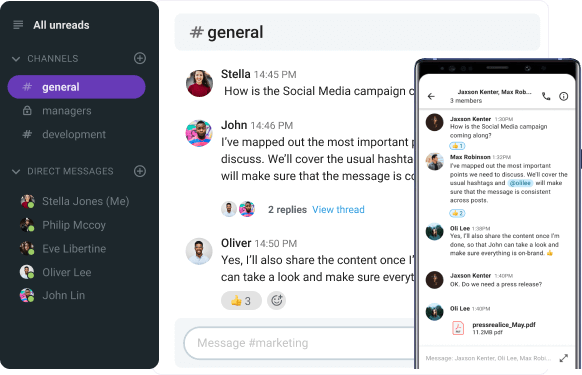We’ve all been there — you’re neck-deep in work, trying to meet that deadline when a coworker asks you for a favor.
Maybe they need an Excel spreadsheet, a presentation for a meeting, or for you to finish writing their blog post.
Although it’s tempting to just brush it off with a quick “That’s not my job!”, you may want to stop and think about whether that’s the appropriate way to talk to your colleagues.
Professional communication may seem like a daunting skill to acquire, but it’s not as complicated as it sounds.
In this blog post, we will go over the steps to professionally say this is not my job.
Let’s dive in!

Why it’s important to say “this is not my job”
Although many managers and CEOs will warn against ever saying “this is not my job”, the reality is that sometimes it’s necessary.
In order to protect your mental health and maintain a good work-life balance, you need to learn to set firm boundaries.
A good work-life balance is crucial for a healthy life.
Work-life balance isn’t just about managing your time between work and personal life, but also being satisfied and content with both.
Furthermore, if you always take on extra responsibilities and agree to every favor a teammate may ask for, you will undoubtedly end up experiencing burnout.
Burnout is an occupational phenomenon — a state of complete emotional and physical exhaustion, caused by long-term stress in your professional life.
Common signs of burnout include:
- Feeling tired and overwhelmed,
- Feeling anxious and trapped,
- Difficulty concentrating,
- High blood pressure, and
- Trouble sleeping.
Almost half of the working population is experiencing burnout as surveys have shown.
So, to be able to maintain good work-life balance and prevent burnout, you need to be confident when setting boundaries and saying “no”.
Now that you understand why it’s important to say “this is not my job”, let’s see exactly how to do it.
Tip #1: Think if you’re actually able to help out
First off, you should pause and reevaluate your position.
Before you rush to decline, consider whether you should at all. Look at your schedule and current tasks and ask yourself if you can fit this new task into your day.
Think about how long this task may take and assess the possible benefits of taking it on.
Maybe your coworker will put a good word in for you in their next meeting with managers, or maybe they will be more willing to help you out when you need a favor.
This is not to say that you should help others only for your benefit, but thinking about it this way may help you decide what to do.
Furthermore, consider if this situation can be a good way to learn something new and gain valuable experience.
Maybe you can learn a new skill or get to know a coworker from another team who becomes your good friend.
When you’ve weighed it all out, and still came to the conclusion that you won’t be able to help, the next step is to form a genuine and polite answer.
Tip #2: Say “this is not my job” in a polite and professional way
Now is the time to think about how you’re going to answer in a professional manner.
Keep on reading to see some possible solutions.
Option #1: “I would love to help, but I don’t have the capacity.”
You can simply explain that you have a lot on your plate and adding this task into your day is just not possible.
If you already have your hands full, it’s not a smart idea to put even more pressure on yourself by taking on someone else’s work.
Furthermore, the quality of your work may be negatively impacted if you need to rush to get it done on time.
So, here’s an example of a conversation where you explain to a coworker that you don’t have the capacity to help them:
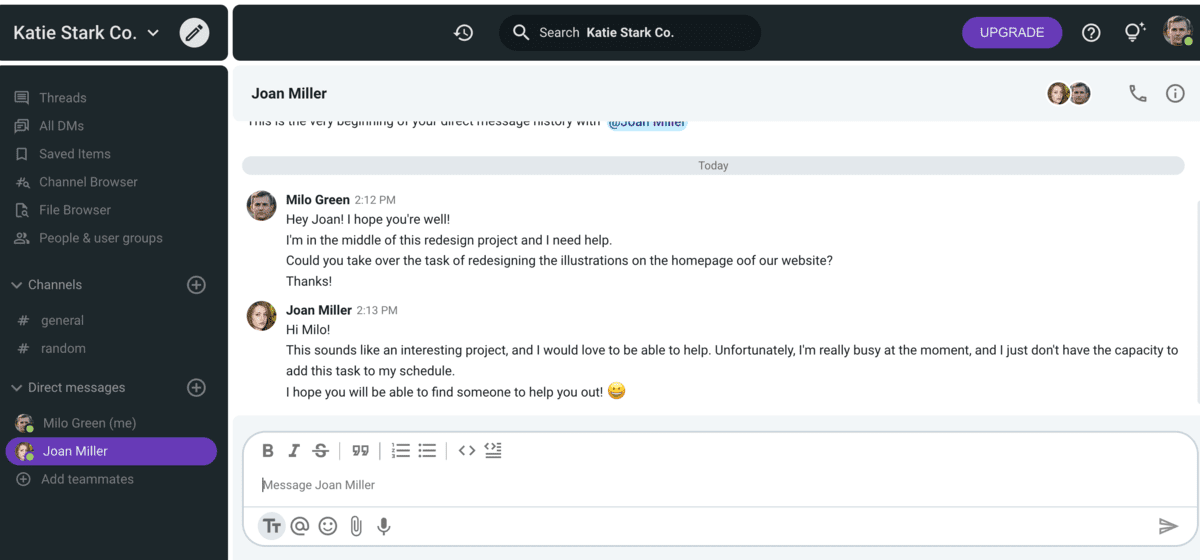
Improve work communication with Pumble
Option #2: “I would love to help, but I don’t feel competent enough.”
You shouldn’t feel embarrassed to admit when you simply don’t know something.
Maybe you’re new to the job, and a senior coworker has asked you to complete a task of theirs that you still haven’t grasped.
Or, the task is related to a field you have no experience in.
Whatever the case may be, you should never accept doing something you are not completely comfortable with.
A message explaining this may sound something like this:
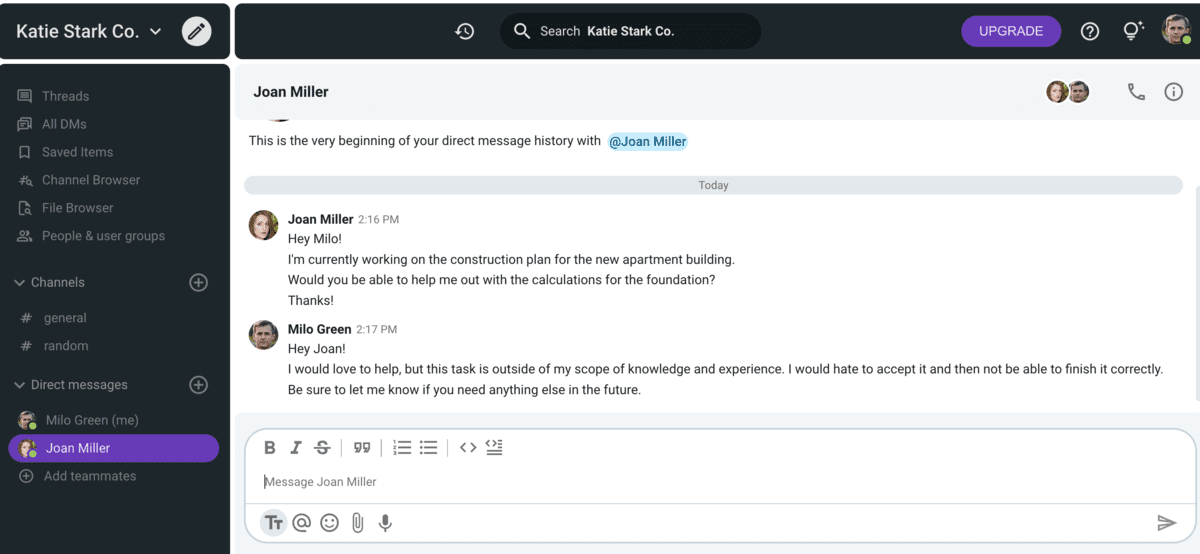
Option #3: “I don’t feel comfortable taking on this task.”
Did your coworker ask for a personal favor, such as picking up their prescription medication or taking their clothes to a dry cleaner?
Or perhaps a teammate has asked you to help out with a task that was strictly meant to be done by them, as part of a job promotion assessment or skill evaluation? Clearly, this is an example of unethical behavior.
If you are close friends with your coworker, a personal favor may not be a big deal to you.
But if you don’t feel comfortable blurring the line between professional and personal life, you have the right to decline any favor that is being asked of you.
At the end of the day, that is definitely not your job.
Moreover, if a coworker has asked you to help out with something you know you shouldn’t be doing, you definitely should not think twice about turning them down.
Here’s what you can say if someone has crossed this boundary:
“Thank you for asking, but I don’t feel comfortable taking on this task. I don’t think it’s appropriate for me to get involved in your personal life in this way. If you ever need anything related to work, let me know.”
Or if your teammate has asked you to help with something you shouldn’t be doing, try responding like this:
“Thank you for asking, but I’m not comfortable with helping you carry this out. I don’t think it’s a good idea. I would advise you to rethink your plan. Take care!”
Option #4: “I can’t help you due to personal reasons.”
A coworker has just asked you to cover their shift tomorrow, but you already have a birthday party lined up that you don’t want to miss.
It’s completely reasonable that you don’t want to work outside of your planned time. A good work-life balance is crucial for your mental health and well-being.
Even if you’re “not doing anything”, as some people like to put it to pressure you into working more, you should never have to explain why you want your free time to be free.
You should never feel pressured to take on more work than you have to, so you should master politely declining to take on someone else’s shift.
Here’s an example of how this may go:
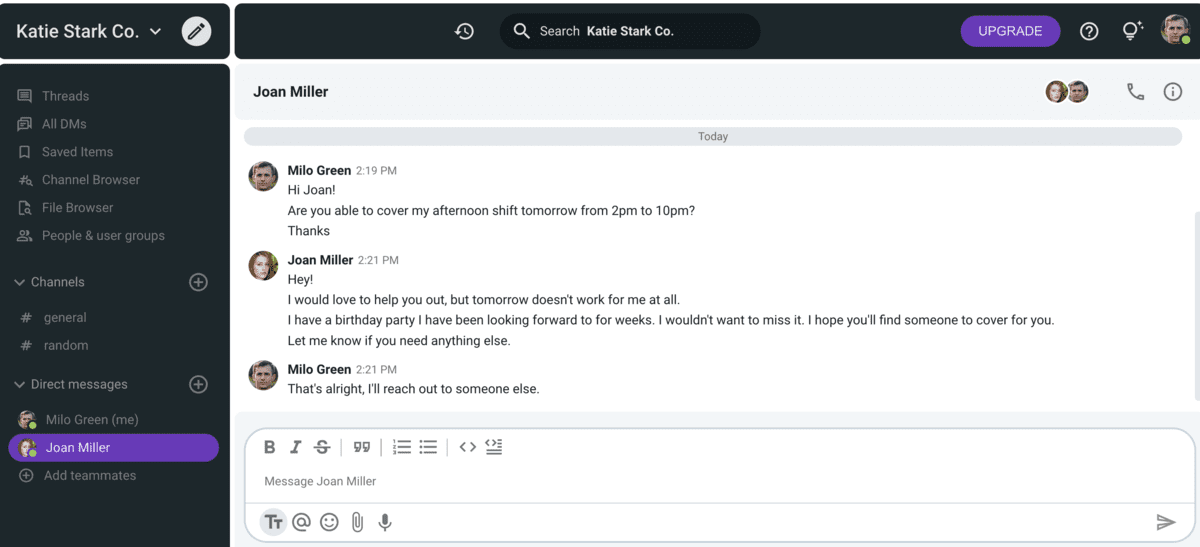
Or if you want to keep it short and sweet — without explaining what you need your personal time for:
“I would love to help you out, but I need my free time tomorrow. I hope you work something out! ”
Option #5: “Can I help you tomorrow?”
Are you willing to help, but don’t have the time right now?
If you have urgent assignments that need to be completed before you can take on your coworker’s task, you should demonstrate enthusiasm while explaining your time constraints.
Also, maybe you can communicate this to your manager and reevaluate your priorities in order to free up time to help a coworker in need.
This way, you can help your coworker while making sure your own work doesn’t get neglected.
Here’s a good way to formulate this kind of response:
“I would love to help you with this task. However, I’m very busy at this time. Is it possible for me to take this task on at a later date when I have more free time? I can take it up with my manager and try to free up some time.”
Tip #3: Offer other forms of help instead
Another way you can deal with these sorts of requests is to point your coworker to resources they can use.
This way, your coworker will feel that you genuinely care about their needs, even if you didn’t actually take on their work.
Option #1: Point them to another coworker
Picture this: A coworker has asked you to prepare a presentation based on the yearly sales report.
You’re not really keen on doing it at the moment, but know another coworker who loves making presentations. Why not redirect this task to someone who would love to help out?
Or, maybe there is someone whose main job is to do the task that has been asked of you.
This is a great way to simultaneously not add to your workload, while still helping out someone in need.
Here’s how that can go:
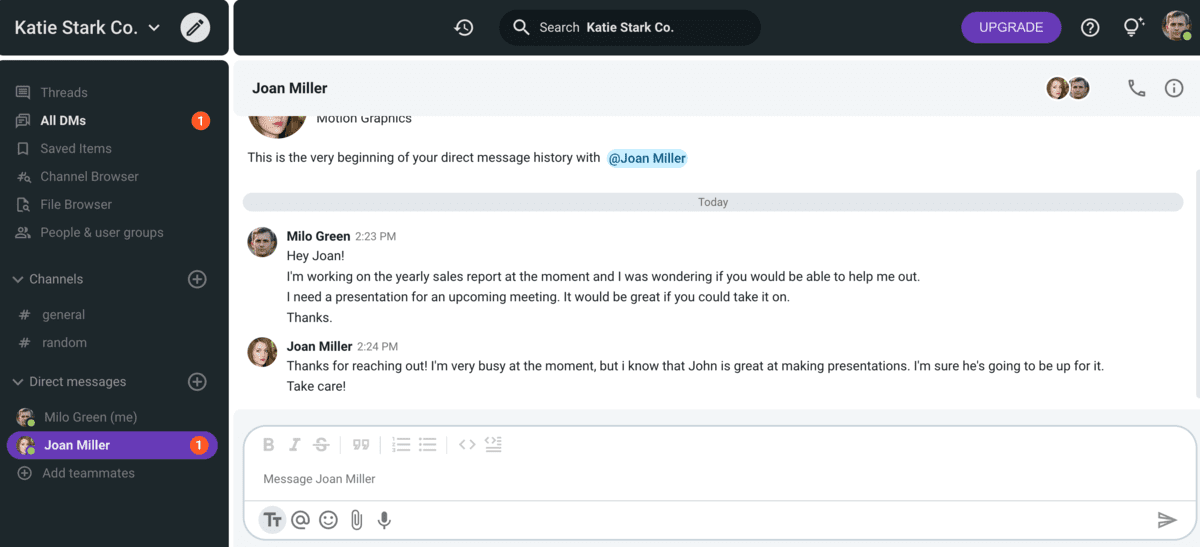
Option #2: Suggest helpful resources
If a teammate is asking you for help and you don’t have the time to help them — you can point them to some helpful resources.
If you know there is a video tutorial or an informative blog post that will help them figure it out by themselves, send them the link. That’s what Michael Scott has done in the Pumble example below.
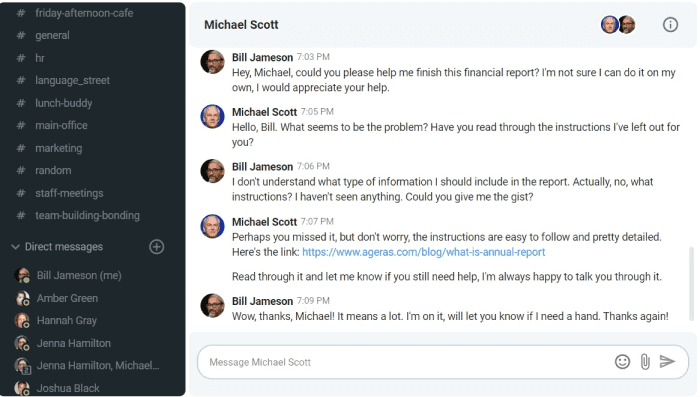
Discuss, share, & collaborate in Pumble
Moreover, maybe you’ve read a beneficial book about the issue they are facing — don’t hesitate to lend it to them.
This way, you make sure that your teammate doesn’t just delegate difficult tasks to someone else, but can actually learn how to do it themselves.
Here’s an example of this kind of response:
“I know it seems like a complicated issue, but I’ve run into it before and it’s an easy fix. Just follow the tutorial in this link I’ve sent you, and I’m sure you’ll get the hang of it. Let me know if you have any questions!”
Option #3: Ask if they need any other form of help
If the task that your coworker needs help with is too time-consuming, you can offer to help with something else for them.
Maybe you can finish up their less important tasks, while they focus on the bigger project.
This way, you’ll let them know that you’re still a team player and that their needs are also important to you while making sure you don’t overwork yourself.
Here’s an idea of how to put this into words:
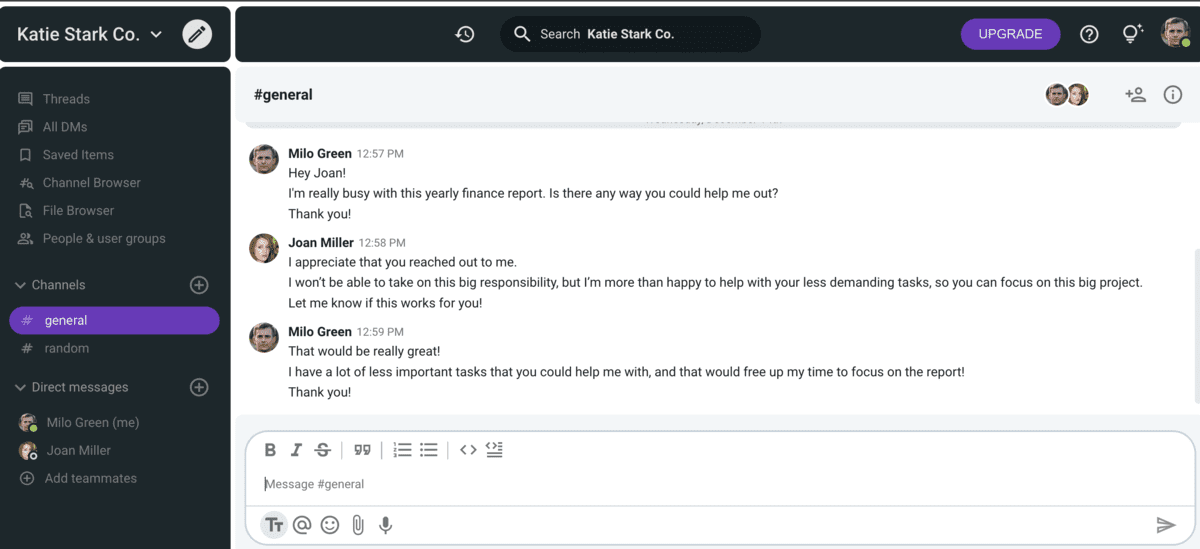
Tip #4: If this is a persisting problem, talk to your leader
Are you under the impression that every now and again you are asked to do something that’s not your job?
Maybe you need to take a good look at your job description and think about whether it’s time to approach your leader about this.
Option #1: Go over your job description
First of all, you need to go over your job description and be honest with yourself.
Are the tasks you’re being asked to help with truly not part of your job, or do you just not feel like doing more?
If you feel that your job description doesn’t reflect what you actually do in your job, this is a sign to reach out to your manager.
However, keep in mind the fact that job descriptions are more estimates than strict rules of what you need to be doing in your role.
Manage your expectations and be ready to hear that what you think doesn’t fall within the scope of your duties actually does.
Option #2: Talk to your manager
With this in mind, you can schedule a one-on-one meeting with your superior and talk about your expectations and reservations.
A good manager will make sure to listen to your concerns and act accordingly.
If they can see that you are overwhelmed with your own work, they should delegate additional work to someone else.
Also, if they are aware that a certain coworker is always trying to get you to do their work for them, they should put a stop to it immediately.
They can also push back deadlines to free up your time if you show enthusiasm about helping your teammate.
In any case, an open conversation about expectations is a healthy way for both you and your manager to communicate.
Option #3: Talk to HR
Maybe your role in the team has organically evolved into a different role than what you started with.
You’ve taken on more responsibilities and are in charge of a lot more than what was in your job description originally.
So, you want to make sure you’re being compensated fairly for the work you put in.
In this case, it may be beneficial to talk to someone from Human Resources, to look into the possibility of a raise, a promotion, or a different role altogether.
Also, if you’re running into problems with certain coworkers who don’t respect your boundaries and don’t take no for an answer, HR is there to help.
How to respond to an employee who says “this is not my job”?
If you are the leader of a team, you may encounter employees who frequently use the phrase “that’s not my job”.
Or, maybe you’ve received numerous complaints about a coworker who is impolite to their teammates?
What can you do in this situation to manage your team in a way that benefits everyone?
Easily communicate through any misunderstanding on Pumble
Tip #1: Inquire about your employees’ workload
One of the first things you should do is make sure you understand what your employee is currently busy with and if they are having any issues with their workload.
A couple of necessary questions may sound like this:
- Do they have too much on their plate, and can’t pick up extra work?
- Do they feel overwhelmed by their workload?
- Do they feel burnt out, and thus aren’t able to take on more responsibility?
- Do they need time off to recharge?
- Do they need more time to finish their current tasks?
Here’s an example of good communication between a manager and an employee, where the manager has asked all the right questions and they came to a solution together.
Hannah has been unusually distracted lately, due to some personal issues, and her manager Zoey has noticed the change.
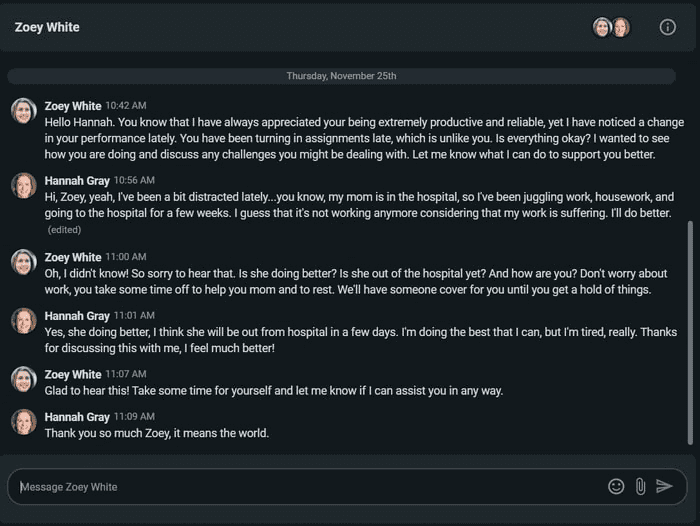
Asking these types of questions will ensure you can understand where they are coming from and why they don’t feel comfortable taking on extra work.
As a good manager, you should be able to gauge how much work is reasonable to expect from an employee and delegate tasks accordingly.
Tip #2: Explain communication expectations
If you frequently get complaints from employees about someone who is always rude and dismissive, maybe it’s time to talk to them about their communication style.
Being assertive and firm with your boundaries is one thing, but if an employee is very blunt and rude to their teammates — that’s a no-go.
To deal with this problem, you can organize a meeting where you explain to them that you have certain expectations when it comes to professional communication.
Instead of bluntly saying “that’s not my job”, you can redirect them to more polite ways of communicating this to their colleagues.
Moreover, you should also explain to them why this type of communication is unacceptable in the workplace, by expressing that their coworkers feel uncomfortable with it.
Tip #3: Go over job expectations
What can you do if there’s an employee who always repeats the phrase “that’s not my job”, even when you can clearly see that it actually is?
You can deal with this problem by reminding them of their job description and expectations.
Maybe the role they have is different from what they started off doing, but that doesn’t mean they get to slack off when asked to do something else.
A good manager will make sure to remind an employee of their job duties, without causing a rift in their relationship.
Tip #4: Ask if they need help
Perhaps an employee really wants to help, but they’re unsure of their capabilities.
If that’s the case, you can offer additional help.
Maybe they would benefit from a presentation or a course, or maybe your whole team can get together for a useful seminar.
Make yourself available for their questions and concerns, and encourage teamwork.
Hone your professional communication skills with Pumble by CAKE.com
It’s not always easy to remain polite and professional when saying that something isn’t your job, but this is the way to go if you want to foster good team relationships.
If your team uses Pumble by CAKE.com for communication and collaboration, you’ll be able to easily set the record straight when it comes to something being within the scope of your job or not.
Pumble allows organizations to:
- Exchange private and group messages,
- Create dedicated channels, and
- Conduct audio calls and video conferences.
All of these different means of communication will make the communication in your organization more effective and your collaboration more productive. And, of course, help you figure out the perfect time (and the ideal way) to say “This is not my job”.




